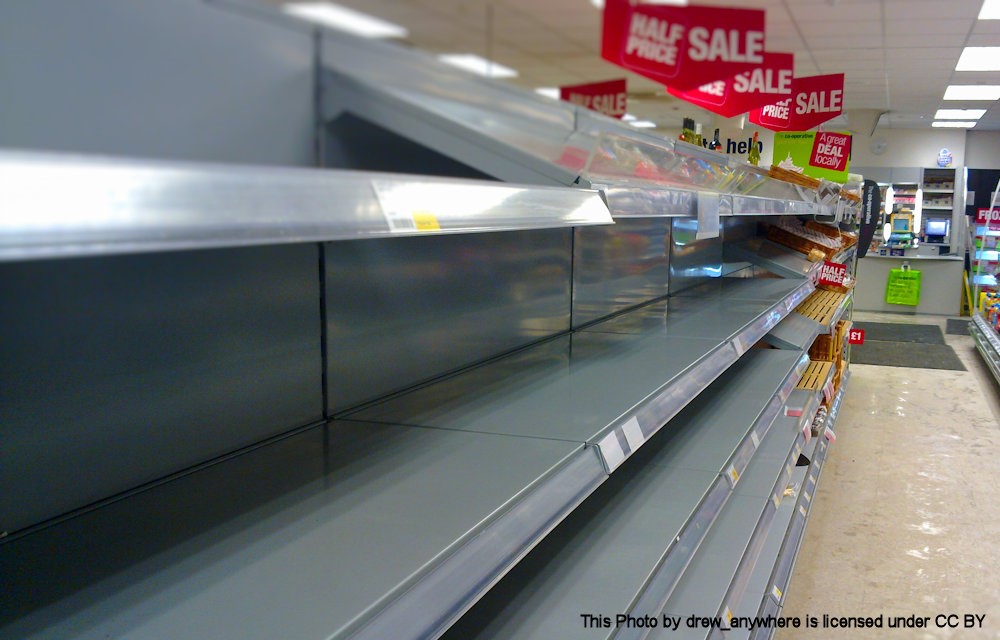Supply chain issues of food and household goods during the Covid-19 pandemic
By Jillian MacBryde - Posted on 8 April 2020
Lack of products on shop and supermarket shelves has been on the news for weeks. Here, Professor Jillian MacBryde reflects on the increased challenges of supply chain management during the current Covid-19 pandemic.
I thought I’d take a moment to reflect on what we can learn about supply chain management during the Covid-19 Pandemic. I’m not teaching a supply chain module this semester – but if I was this is certainly one of the conversations I would be having with my students...
Before the lock down my sensible head was saying, “Jill there is absolutely no need to go mad buying things like toilet roll!” As someone who knows about supply chains, I’m confident that companies like Kimberly-Clark (best known in the UK for Andrex), Essity (with brands including Cushelle and Lotus), and many others are still producing millions of rolls every day the UK and have warehouses of stock. I am also confident that our supermarkets have very sophisticated planning systems and there is no need to worry that we are going to run out of toilet paper in the UK. But faced with empty shelves, social media panic, and - the thing that pushed me over the edge - my normally sensible, neighbour telling me she had just done an “end of the world” shop, I lost control and went in search of toilet roll and lots of other food and household products that I didn’t really need!
The thing about toilet roll is there is normally steady and predictable demand – we use it at a fairly constant rate. There is no shortage of raw materials, there is stock in the system and manufacturers are increasing production in light of the “panic” so we should see our supermarkets shelves filling up again. Indeed with producers ramping up production and some panic buyers with cupboards full of toilet roll we might see an oversupply in months to come although that’s not much consolation for the person who has none in their bathroom today! A variance in demand sent shock waves through what is normally a very smooth supply chain. Some of you who have studied operations management or supply chain management might have read about “the bullwhip effect” (which might not have meant much to you at the time!) but that’s exactly what we are seeing here. The bullwhip effect suggests that a change in the demand side (which here is the panic buying) in turn causes ripples through the supply chain and results in amplified disruption at the supply end.
In reality it has taken supermarkets longer than I expected to replenish their shelves. The problem here is not the stock itself, it is other parts of the supply chain system – there are fewer people on the roads driving the vans and trucks, there are fewer people stacking the shelves in the supermarkets, there are fewer mechanics servicing the vans and so on. With panic buying taking place, supermarkets haven’t been able to restock their shelves quickly enough with things like toilet paper and tins of soup. However in recent days we have seen people pulling together in the face of the crisis and we are also seeing companies who have ceased operations (such as restaurants and pubs) offering up free capacity including their trucks and vans to support delivery of key items. The government is treating logistics workers, such as lorry drivers, as essential workers, so they are able to keep their children in school and go to work if they are healthy.
However, there are other types of products where we might see more fundamental supply chain challenges in the longer term. With many borders closed, and lockdowns in many countries, we will start to see how fragile some of our international food supply chains really are. Close to home we are hearing from farmers that as crops become ready for harvesting there aren’t enough people to pick the crops, which could lead to crops withering in the fields. But also think of all the foods we buy where the raw ingredients originate from far-flung places and think about the disruption all over the world, with crops not being planted, deliveries not being made, factories ceasing production, borders being shut - and you might start to reflect more on the real challenges of supply chain management.
The Photo accompanying this post by drew_anywhere is licensed under CC BY










